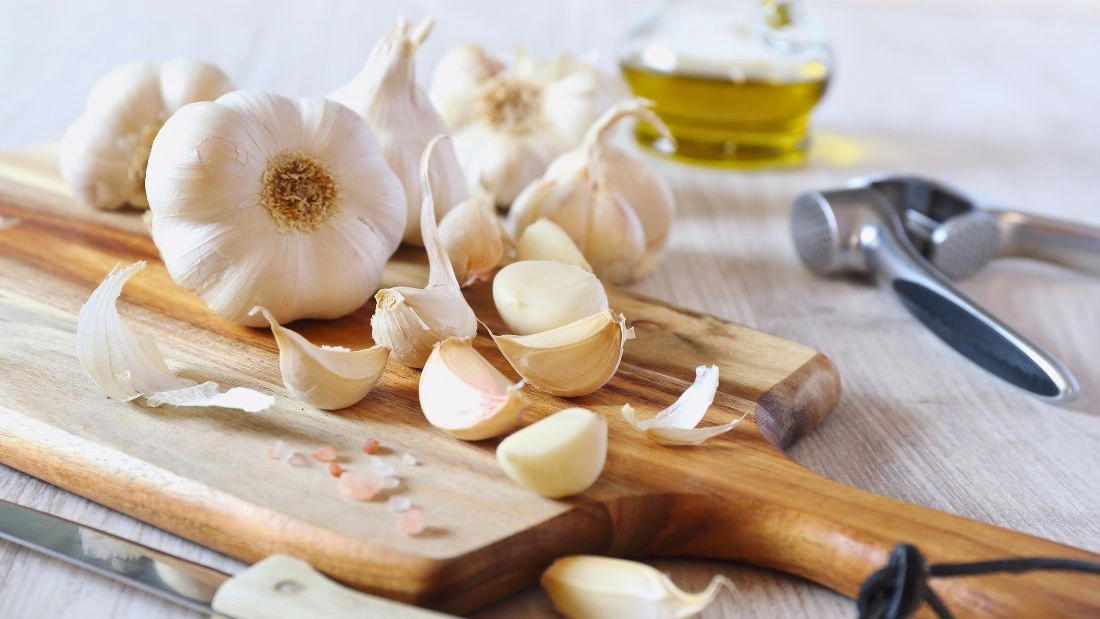Garlic

Garlic is a true powerhouse with many sulphur phytochemicals which are stronger than those in onions and offer a number of health benefits.
Garlic (Allium sativum) is a bulbous flowering plant in the Allium family, which includes onions, shallots, leeks and chives. It has been used in cooking and as a traditional remedy for thousands of years across many ancient civilisations, including those of Egypt, Rome and China and remains a staple in many cuisines and folk medicines, particularly throughout the Mediterranean and Asia.
Garlic does not contribute a significant amount of nutrients because we eat it in such small quantities, so its real value lies in its bioactive sulphur compounds, especially allicin, which forms when you chop or crush garlic and is responsible for its distinct smell.
Heart health benefits
Celebrated in popular culture for keeping vampires away, it’s perhaps appropriate that many of garlic’s health benefits are linked to blood. Studies suggest allicin can relax blood vessels and improve circulation, which may reduce blood pressure, especially in those with hypertension. Garlic may also reduce LDL ‘bad’ cholesterol in the blood – but only moderately and you still need to eat a healthy, plant-based diet to protect your heart.
Garlic’s sulphur compounds can reduce blood clotting – a positive property if it helps prevent dangerous blood clots from forming but if you’re taking blood-thinning medication or preparing for surgery, ask your doctor about garlic to stay on the safe side.
Antioxidant properties
Garlic contains potent antioxidants that protect your cells from oxidative damage caused by free radicals, harmful by-products of metabolism. Such damage contributes to many chronic conditions such as aging and cognitive decline. Garlic’s anti-inflammatory effects may also help lower the risk of chronic diseases, including heart disease, diabetes and cancer.
Aged garlic extract (AGE) is made by storing garlic for 10 to 20 months in an ethanol/water mix which leads to higher antioxidant and anti-inflammatory properties. AGE is therefore considered more effective than fresh garlic in protecting against neurodegenerative diseases such as Alzheimer’s.
Antimicrobial action
Garlic’s sulphur compounds also have antimicrobial properties that can combat infection by some bacteria, fungi, viruses and even some parasites. Garlic can support your immune system and some studies suggest it can lower your risk of catching a cold or may reduce its symptoms.
Supports iron absorption
Garlic helps your body absorb more iron (and zinc) from foods such as grains and pulses. Its natural sulphur compounds boost the production of a protein called ferroportin, which acts as a channel carrying iron from your gut cells into your bloodstream. This means eating garlic with iron-rich plant foods can help your body use the iron more efficiently.
Getting the most out of garlic
Raw garlic contains the most allicin – the main bioactive compound. It forms when garlic is crushed or chopped but quickly degrades with heat, so cooking reduces its effectiveness.
You can chop garlic and swallow small pieces with water like a pill, but let it sit for a few minutes for the allicin to form. Don’t overdo it – limit yourself to just one or two cloves a day as too much can cause digestive problems. Alternatively, add fresh, chopped garlic to salads, dressings, dips etc and if you prefer to cook with it, let it sit for a while after chopping then add it at the end of cooking.
Aged garlic extract (AGE) may be useful for heart health, long-term antioxidant support and gentler digestion but for quick immune support or antimicrobial effects, go with fresh raw garlic. For most people, including both AGE and fresh forms in the diet will maximise the health benefits.
Detrimental effects
You may need to avoid garlic if it causes heartburn, nausea, vomiting or diarrhoea. While true garlic allergy is rare, intolerance or sensitivity is more common and can cause symptoms similar to IBS.
Garlic can potentially cause flare-ups in people with lupus. This is because garlic stimulates the immune system, which can be counterproductive for people with autoimmune conditions where the immune system is already overactive. Furthermore, if you’re scheduled for, or are recovering from, an operation, steer clear of garlic because it can prolong bleeding.
Eating garlic during pregnancy as a part of a balanced diet is considered safe but garlic supplements are not recommended during pregnancy. As with onions, never give garlic to cats or dogs because it’s toxic for them even in small amounts.




